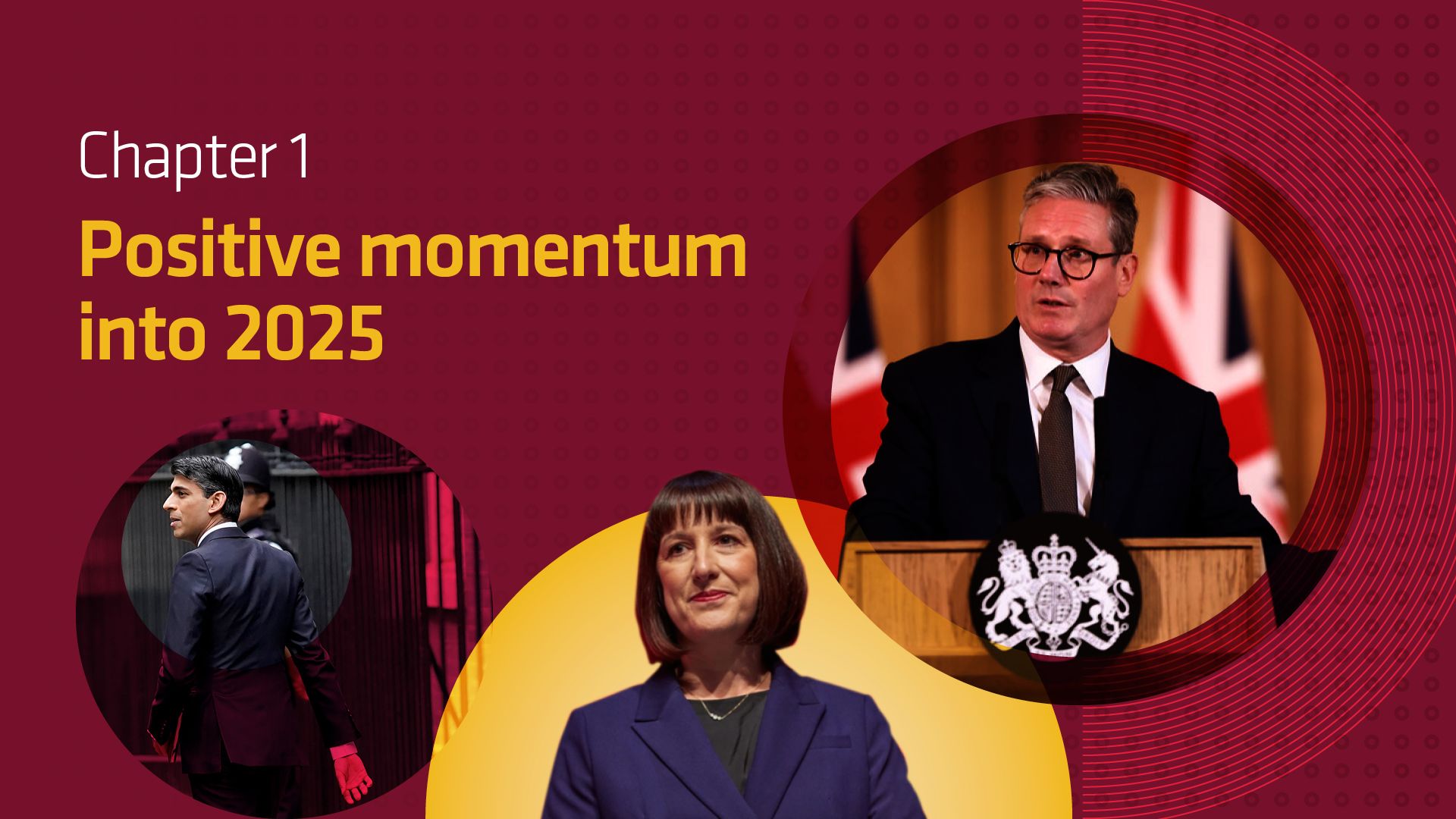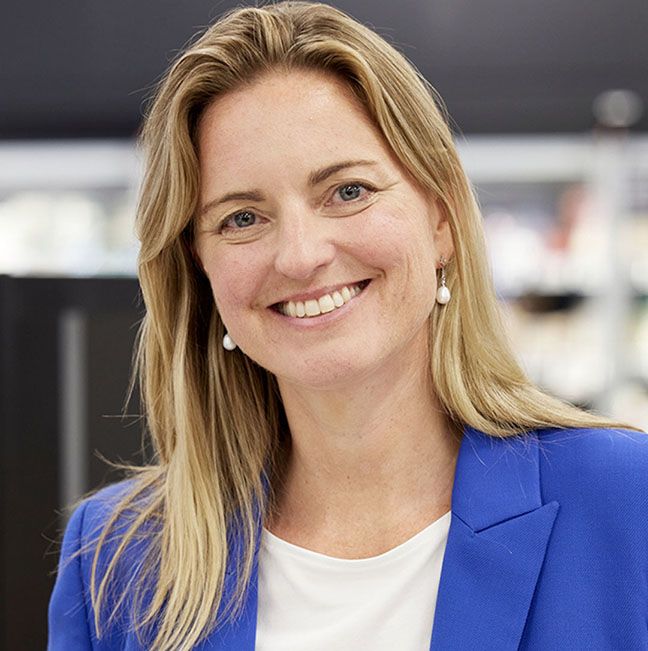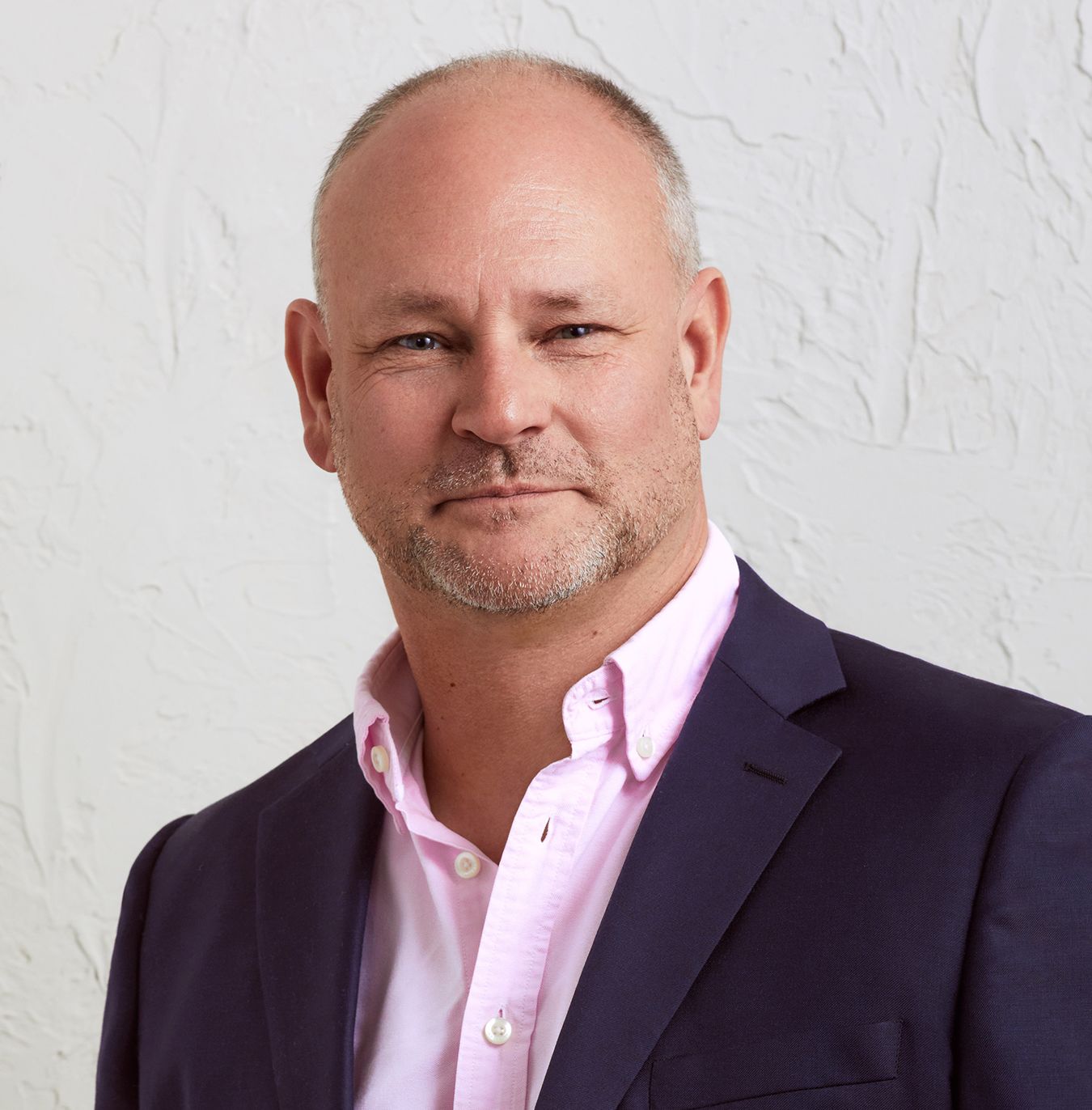
Stronger-than-expected growth at the start of 2024 meant the UK quickly emerged from the recession it entered at the end of 2023.
Economic growth of 0.7% between January and March 2024 was the fastest rate recorded for two years, according to official figures from the Office for National Statistics (ONS). For the first half of the year, the Bank of England interest rate was at a 16-year high of 5.25%, but with inflation falling it is widely expected that the interest rate will come down before the end of 2024.
Other indicators that 2025 will see further improvements in UK economic stability come from consultancy KPMG and global policy organisation the Organisation for Economic Co-operation and Development, which predict growth of 0.9% and 1% respectively. This would mark the UK as having the slowest growth in the G7, but a new Labour government with a huge majority and on a “change” agenda could yet stimulate more growth in the months ahead.
Indeed, economic forecaster and analyst group Trading Economics forecasts UK retail sales growth of 2.2% in 2025.
As for the retail industry’s assessment of it all, 85% of the 39 retailers we interviewed expect year-on-year-sales in 2025 to be higher than in 2024 – with 13% expecting sales to be “much higher”. This is a more favourable sentiment than last year, when 71% of retailers were expecting to see year-on-year growth in 2024.
Not all of the interviewees are the same as last year, but there is a strong crossover of voices, so we can conclude the industry is more confident going into the new year than it was 12 months ago.
''We will continue to open stores and expect good growth in the core estate''
''2025 will be the year when we are mixing up the products we’re launching... it won’t be anything you’ve seen from Lounge before''
Reasons to be cheerful
From new stores opening and rising consumer sentiment to rolling out fresh strategies, there are multiple reasons why retailers feel their businesses are in line for growth in 2025. We have picked out some of those feeling confident.
For retailers such as Jollyes, Lounge and Blakely, it is a matter of retail fundamentals, with bricks and mortar, product focus and logistical investment driving business.
Joe Wykes, chief executive of pet supplies retailer Jollyes, which opened its 100th store on March 1 and continues to add to its store numbers, having gone from 66 to 106 in three and a quarter years, says: “We will continue to open stores and expect good growth in the core estate.”
Jollyes’ store estate has grown from 66 to 102 shops in three and a quarter years.
Daniel Marsden, chief executive of underwear retailer Lounge, which reported a £2.6m reduction in profit before tax in the year to June 30, 2023, to £5.5m – but sales growth of 6% to £67.9m – comments: “We are a brand that is laser-focused on our mission; 2025 will be the year where we are mixing up the products we’re launching. We can’t reveal too much just yet, but it won’t be anything you’ve seen from Lounge before and we’re sure it is going to make our mark in fashion and not just underwear.”
Global gains
Lounge said in May that much of its sales increases came from international expansion, and there are several retailers eyeing global growth in the year ahead.
Gareth Newman, chief executive of fashion brand Blakely, says the company generated sales of £33m in 2023 and will hit £60m in 2024. He remarks that growth across the EU is a key focus in the coming year, with a post-Brexit HQ and warehouse now set up in Belgium serving the European market.
“The EU is obviously a 300-million-people area, so, there’s a lot more scale there for us,” he says.
“Menswear does well in the EU already, and we’re anticipating that growing, but also women’s to do the same.”
Nathan Williams, chief executive of nursery and babycare retailer Mamas & Papas, which reported full-year sales of £144m and £10.9m in profit for the year to March 2023, says it is a combination of like-for-like growth, new space, international expansion and playing in new categories that is fuelling his retailer’s expected sales hike in the year ahead.
“International expansion is our fastest-growing channel this year,” he says about the business, which said in January that it was on course for a record year of sales in 2024.
He adds: “We are expanding our business in Spain with El Corte Inglés. We have now opened our local retail conglomerate partnerships with Central Group in Thailand, and we’re launching with MAP group in Indonesia. We’re expanding our Australian operations, too. So we’ve got a lot of new international business.”
Certainly, not having to rely solely on the UK market is a positive for retailers, with menswear brand Percival’s founder and chief executive Chris Gove saying: “We're seeing signs of economic recovery within our demographic.
“But also a third of our customer base is US-centric, specifically on the coast, so LA and New York. And it just seems like their wallets are more robust.”
Gove adds of the company that grew sales from £8.5m to £11.7m between 2022 and 2023: “Our average order value is about a third higher in the US; first order profitability is twice as high. And we charge 20% more in the US and we don’t see any resistance to that.”
''International expansion is our fastest-growing channel this year''
''A third of our customer base is US-centric, specifically on the coast, so LA and New York. It seems like their wallets are more robust''
''People are waiting for interest rates to come down to really see a meaningful change in behaviour, but it is looking like a much more stable set-up for growth''
''There are still some categories that are performing exceptionally well. Beauty is proving time and time again to be recession-proof''
''There is probably more of a lag to consumer recovery than people might understand. I think we'll see some recovery, but it might be slightly longer than people hope for''
Consumer sentiment – looking up?
Positive vibes are filtering through from retailers in general, relating to the economic situation, after a tough few years for the industry and the consumer.
Anja Madsen, retail chief operating officer at Pets at Home, says: “Across the market, people are waiting for interest rates to come down to really see a meaningful change in behaviour, but it is looking like a much more stable set-up for growth.”
The CEO of one clothing retailer does not think consumers were confident to spend in 2024 – but 2025 is a different story.
“I think there’ll be more opportunity for people to have felt the benefit of some of the wage rises, some of the changes in the cost of living starting to play out a little bit more,” they say.
The chief executive of one fashion retailer is optimistic that by next year things will “generally feel more positive” because 2024 has been a year of multiple elections around the world, wars and high interest rates globally.
They add: “Hopefully a resolution to the Middle East [crisis] will have happened. If I were a betting person, I would think things will feel a little bit more solid next year and there will be a little bit less uncertainty.”
For Cotton Traders chief executive Nick Hamblin, the expectation for sales growth is due to the “macroeconomic bounce expected in H1 2025, coupled with spring-summer optimism”. The fashion retailer will also be investing in brand awareness and new store openings to support its plans.
Cotton Traders’ operating profit in the financial year 2023 fell 9.9% to £9.8m, off the back of a 1.7% dip in sales to £109.4m.
Online retailer Notonthehighstreet is confident that consumers will be spending more in 2025, and chief executive Leanne Rothwell picks out several categories that are flourishing this year.
“There are so many industry bodies really expecting to see a return to growth late 2024 into 2025,” says Rothwell.
“The interesting point here is that, despite the challenges that are being seen across the retail environment right now, there are actually still some categories that are performing exceptionally well. Beauty is proving time and time again to be recession-proof. I think there are good, positive signals coming through from electronics due to demand centred around all of the sport this summer.”
There is confidence in the food retail world, too, with frozen ready-meal retailer Cook co-founders and co-CEOs Ed Perry and Rosie Brown saying sales are expected to be “slightly up” year on year in 2025.
“As long as inflation isn’t too grim, it means we don’t have to be too aggressive on pricing,” notes Perry, whose business reported full-year net sales growth of 12% to £106m and operating profit almost doubling to £4.5m in 2022.
“It will also be driven by new shops. We’ll be opening a minimum of six and a maximum of 10 per year, so a combination of new space and like-for-like growth means [we estimate] slightly higher sales, but it could be even better than that.”
Nick Collard, chief executive of Bensons for Beds, which reported turnover for the year to September 30, 2023, of £257.5m and EBITDA profit of £1.5m after a £15.4m loss the year before, echoes this positive stance and comments: “I'd hope to see some slight growth coming back into the marketplace.
“Our view would be there is probably more of a lag to consumer recovery than people might understand, given the overhang on overall living standards. So, I think we’ll see some recovery, but it might be slightly longer than people hope for.”
Reasons to be cautious
Indeed, the results from this year’s interviews show retailers are right to be cautiously optimistic. Retailers are often overly confident of how sales are going to be in the year ahead.
And although the UK economy bounced back quickly from recession, there are critics who worry about issues to come. Respected economic thinktank the Resolution Foundation is concerned that the UK has encountered three recessions in the past 16 years. This occurrence happened every 10 years, on average, during the second half of the 20th century, so the UK is falling into recession twice as frequently as it was pre-millennium.
The thinktank wants the new government to “change the record” on that front and tackle what has been a period of stagnation over the last two years.
Other challenges retailers face include the recent hike to the National Living Wage, which jumped from £10.42 to £11.44 an hour in April 2024 and was broadened to those aged 21 and over, rather than 23-plus as it was previously.
Many retailers expect this to impact profitability next year, and the new Labour government has committed to a ‘Plan to Make Work Pay’, which is expected to result in further pay increase mandates in the months to come.
Shipping cost volatility, business rates and difficult-to-read consumers also stand out as concerns.
Gill Smith, managing director of The Perfume Shop, which reported a £2.5m drop in profit to £18.6m in the year ended December 30, 2023, despite revenue growing 4.6% to £289.2m, says: “Price inflation has slowed, which was a major factor last year, but customers are saving more as they are still nervous of the future and discretionary-spend items are the first to be hit.
“Any interest rate reduction and impact on mortgages or rents will take time to filter down into customers’ pockets. The new government will take time to put any new growth or income policies into place, and this will take time to translate into customer confidence and spending.”

The cost of doing business
Assessing drags on profitability next year, Gavin Peck, chief executive of The Works, which reported a like-for-like sales decline of 0.9% in the 53 weeks to May 5, remarks: “Cost headwinds such as increases in the National Living Wage and business rates will remain in 2025.
“At the same time, freight costs remain uncertain, caused by ongoing global supply chain volatility.”
Homebase chief executive Damian McGloughlin cites “unforeseen crises” as a drag on profitability, using the increase in shipping container costs as a prime example. As a seller of DIY and garden ranges, the unpredictable weather and “late summer” is one of the key areas impacting the business, he adds.
McGloughlin says: “The continued decline in consumer confidence and rise in the cost of living are also set to have an impact on profitability.”
In its results for the year to January 2023, the home improvement retailer reported an £84.2m loss from a profit of £30m the year before. Revenue dropped from £788m to £701m during the period.
David Robinson, chief executive of Dobbies Garden Centres, is confident in sales growth in 2025, with inflation down to 2% and “everything stabilising”, but admits a nervousness around freight. Shipping costs have soared, with freight market tracker Xeneta suggesting at the time of writing that the average cost of shipping a 40ft container exceeds $4,000 (£3,110) – a 140% increase compared with 2023.
“Clearly, that market looks relatively inflationary – whether that persists into 2025, we’ll need to see,” Robinson says.
Harvey Bennett, chief executive of Gift Universe, is positive that retail sales will continue to grow year on year in 2025, but he also cites uncertainty around freight costs and shipping times as potential challenges – as well as property costs.
“We source a lot of our products from the Far East, so higher freight costs put pressure on profitability,” he explains.
“There are also some unknowns around property costs as we do not yet have visibility of future levels of business rates relief.”
Retailers are often realists and are very aware of how macroeconomic factors impact their trading and profitability.
F Hinds’ sales have risen each year for the past five years, but chair Andrew Hinds is cautious for 2025, partly because “expecting to achieve huge increases every year is unrealistic”.
Rising operating costs, inflation, wage hikes and precious-metal prices going “through the roof recently” are all factors expected to have an impact on profitability at the jeweller.
“Business rates are still a big burden; even though breaks and revaluations are actually feeding through to lower bills, the percentage they're charging still seems pretty onerous,” Hinds adds.
''There’s uncertainty around property costs – there's business rates relief at the moment, but we don't know what that'll look like next financial year. If that changes, that could put pressure on the business''
''Business rates are still a big burden; even though breaks and revaluations are actually feeding through to lower bills, the percentage they're charging still seems pretty onerous''
''Because we're not a big organisation with lots of slots for people to drop into, you end up having to pay people more to pretty much do the same role''
''There are concerns around supply chain and the elements we can control less, such as weather patterns and global effects of things like crises in Ukraine and the Middle East and whatever else comes our way''
Expect the unexpected
Colin Temple, managing director of Schuh – which posted turnover of £353.4m for the 12 months to January 28, 2023, up from £305.8m the year before, and pre-tax profit growth of £1.8m to £13.4m – suggests the consumer is generally very discerning right now, making things difficult to predict for the year ahead.
“It’s not like us not to have an opinion but we’re not too sure, and I think that’s probably not a unique answer given where we’re at [from an economic perspective],” he explains. “There’s actually a little bit of price resistance out there – [consumers are] not the best at compromising. They want to shop but the product needs to be exactly what they want.
“Our kids’ business has been outstanding, with most brands up year on year. You tend to find parents and carers will prioritise their children over themselves, so there will always be a strong market for kids. We see growth potential here.”
In a competitive industry, retailers need to battle to retain their talent, and Molton Brown – which according to parent company Kao put in a “steady” sales performance in 2023 that partially offset a wider decline in the group’s wider cosmetics business – offers a case in point about what this means for operating costs.
Simon James, EMEA general manager for the beauty retailer, says being a Real Living Wage employer means staff salaries are on the rise across the business. However, the organisation is also at a stage where senior staff and those just below director level have been in the business a long time and this is prompting requests for a round of pay rises.
“Because we're not a big organisation with lots of slots for people to drop into, you end up having to pay people more to pretty much do the same role,” he comments.
If retailers have learned anything in the past few years, it is to expect the unexpected – with disruption from sources outside their control an ongoing concern.
Paul Hayes, chief executive of fashion retailer Seasalt, which is predicting to continue its growth story in 2025, with turnover up by £22.5m to £118.9m in the year to January 28, 2023, but profit before tax declining by £4.7m to £1.7m, describes the bigger picture.
He says: “There are some concerns around supply chain and the elements we can control less, such as weather patterns and global effects of things like crises in Ukraine and the Middle East and whatever else comes our way.”











